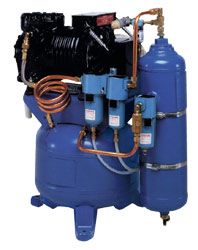 Dentists work diligently to create an office that is both a welcoming and highly functioning space. A lot of time, money, and effort go into creating a successful practice. Between the technologically advanced dental equipment, clean-cut and well designed offices, and state-of-the art designs and furniture, it is easy to see how several components have to successfully function as a cohesive whole in order for a practice to thrive. The dental compressor is merely one appendage to the dental practice machine. It is by no means the most attractive component, but the role it plays on a daily basis cannot be overstated. Dental compressors allow dental offices to run smoothly.
Dentists work diligently to create an office that is both a welcoming and highly functioning space. A lot of time, money, and effort go into creating a successful practice. Between the technologically advanced dental equipment, clean-cut and well designed offices, and state-of-the art designs and furniture, it is easy to see how several components have to successfully function as a cohesive whole in order for a practice to thrive. The dental compressor is merely one appendage to the dental practice machine. It is by no means the most attractive component, but the role it plays on a daily basis cannot be overstated. Dental compressors allow dental offices to run smoothly.
Dental Compressors are depended upon to clean, dry, and store air. This air is the driving force behind handpieces, dental chairs, and helps to operate dental units and syringes. The dental compressor functions by working to lower the temperature of the compressed air through what is known as “an after cooling system.” Before the air even reaches the dentist’s handpiece, the compressor has already worked to remove impurities from the compressed air as well as moisture from the air through a drying system. The quality and dependability of any dental compressor is based upon the ability of it to perform these tasks both reliably and consistently. Dental Practices rely on the supply of clean, germ-free, dry, and oil-free compressed air. Without these things, any office will begin to decline in areas of productivity and efficiency.
Dental compressors can be somewhat costly, but a properly sized and well maintained compressor can last over 10 years. To ensure longevity of a compressor, it is vital for dentists to take into consideration factors such as how the machine will function under additional stress and workloads. If your compressor has to work harder than it actually should and can, it could easily and quickly break. Also, if a compressor is forced to take on too much work, the air drying components will typically not be able to keep up either. This will result in wet and unclean air. To combat these costly mishaps, dentists can simply check their air compressor on a weekly basis to ensure that they are properly functioning and have no indication of an overload or problem. Also, options such as twin head systems are available on today’s market. These options allow the dentist to switch between the compressor heads should one need maintenance. This will allow the office to fully function and carry on daily activities until further inspection or technical help can fix the problem. Several dentists are currently opting for this safe solution.
In today’s market, there are several factors and models to consider when purchasing dental compressors. Because they can play such a huge part in the day to day functionality of a practice, it is important to take time to truly review components and information before purchasing one. By investing in the right dental compressors for your practice now, you can ensure quality, consistency, and reliability for years to come.
Maintaining and Purchasing the Right Dental Compressor